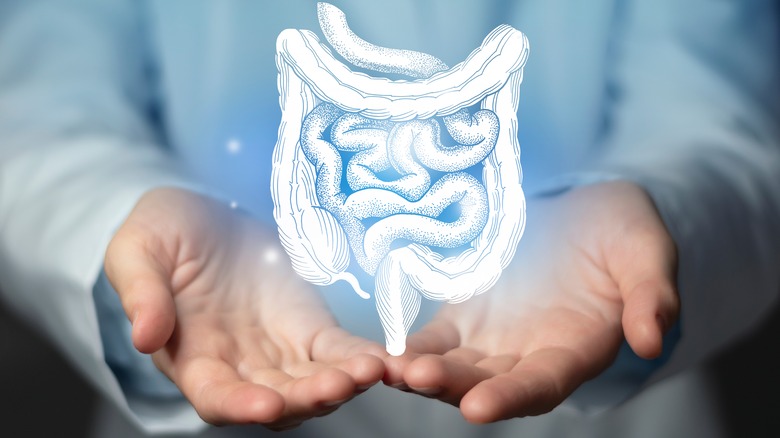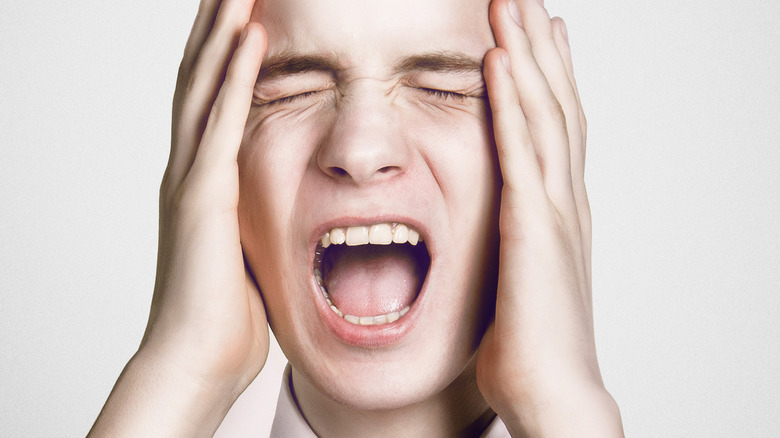What Happens When You Stop Taking Antidepressants
Without a doubt, depression can severely affect a person's quality of life. It changes your thinking, and can make you lose concentration. Your eating and sleeping habits also change, and you lose interest in pleasurable activities. If a person suffers from depression, it can make them feel worthless, or even cause them to contemplate ending their life (via MedlinePlus).
As of 2020, 12% or nearly 25 million adults in the U.S. had been prescribed antidepressants for over two years (via Psychology Today). Doctors prescribe antidepressants to those who experience at least one major depressive episode lasting at least two weeks. These events go beyond sadness to hopelessness, worry, or fear (via the National Institute of Mental Health). Receiving an antidepressant prescription enables many patients to acknowledge their symptoms and begin to work toward feeling better. This confidence allows them to work with their doctors to determine the best treatment (via University of Oxford).
Many patients become less willing to endure side effects, including headaches, exhaustion, nightmares, and reduced sexual desire, as their depressive symptoms wane, causing some to consider stopping their use. However, in doing so, one risks not only depression recurrence, but also additional problems if the medication leaves the body too quickly (via Harvard Health).
If you or someone you know needs help with mental health, please contact the Crisis Text Line by texting HOME to 741741, call the National Alliance on Mental Illness helpline at 1-800-950-NAMI (6264), or visit the National Institute of Mental Health website.
How do antidepressants work?
Antidepressants increase the levels of the neurotransmitters believed to be responsible for regulating mood, noradrenaline and serotonin (via Mind). These medications take a few weeks to become effective (via the Centre for Addiction and Mental Health). These medications help nearly 70% of those who use them, and the percentage increases when patients try a second antidepressant when the first one fails to provide relief.
There are several different types of antidepressants. The most commonly prescribed are known as SSRIs. Fluoxetine (Prozac) and citalopram (Cipramil) have the least side effects of all antidepressants and the least severe overdoses, according to the NHS. This is because SSRIs allow the serotonin to stay longer in your brain and body (per Mind). SNRIs are similar to SSRIs, except instead of just working on serotonin, it also works on noradrenaline. Venlafaxine (Effexor) and duloxetine (Cymbalta) are two commonly prescribed SNRIs.
NDRIs (norepinephrine and dopamine reuptake inhibitors), including bupropion (Wellbutrin), give users energy and help treat attention-deficit/hyperactivity disorder. NDRIs also help people quit smoking. Meanwhile, NaSSAs (Noradrenaline and specific serotonergic antidepressants) like mirtazapine (Remeron) are on the opposite end of the spectrum. This type of drug helps people sleep. It also calms anxiety and stimulates the appetite.
If you fail to respond to other antidepressants, your doctor may try an tricyclic antidepressant (TCA). TCAs like amitriptyline (Tryptizol) have more side effects and cause more problems if an overdose occurs (via NHS).
Antidepressant discontinuation syndrome
Studies show that 40% of those that stop taking their antidepressants develop what is known as antidepressant withdrawal syndrome (AWS), per a 2021 study in Therapeutic Advances in Psychopharmacology. AWS occurs within four days of stopping or significantly reducing the dosage of your medication.
For most people, problems associated with AWS clear up in a few days if the drug or a similar one is taken or within a week or so on its own, according to an article in the Canadian Medical Association Journal (CMAJ). Per the American Academy of Family Physicians (AAFP), the longer you have been on the drug and the longer its half-life, the longer your symptoms of AWS are expected to last. The half-life of a drug is the time it takes for your body to break the amount of the active substances in half. This breakdown could last from a few hours to a few weeks, depending on the medication and how your body processes it (via Mind).
Common symptoms of AWS fall under the mnemonic device FINISH, which stands for Flu-like symptoms, Insomnia, Nausea, Imbalance, Sensory disturbances, and Hyperarousal. FINISH enables medical professionals to quickly diagnose and treat AWS (via AAFP). Prompt diagnosis enables doctors to distinguish AWS from other medical issues, including depressive illness relapse, bipolar manic episodes, and other neurologic conditions.
Digestive issues
Stomach problems are twofold when it comes to antidepressants, as many users report feeling queasy when they start taking the drug. In addition, nausea and vomiting could cause a patient to stop taking their medication, leading to even more abdominal problems (via PsychCentral).
Those who abruptly stop taking antidepressants often complain about gastrointestinal problems (via Harvard Health Publishing). Some common issues include nausea, abdominal pain, and diarrhea, per a 1998 study in the BMJ. Bloating and indigestion also occur, leading some to believe they have irritable bowel syndrome (IBS), according to Rxisk. These findings are not surprising, considering 90% of the serotonin your body uses is made and found in your gut. Your body creates serotonin from the amino acid tryptophan using a bacteria known as enterochromaffin. Antidepressants lower the amount of this bacteria and the production of serotonin by as much as 50% (via News Medical).
Stomach and other issues occur when you abruptly stop taking your antidepressant, because your body and brain need time to adjust to the change in neurotransmitter levels (via Royal College of Psychiatrists).
Heat intolerance
Using antidepressants interferes with your body's thermoregulation. Your hypothalamus regulates your body temperature, controls your blood pressure and thirst, and is affected by using antidepressants (via Psychology Today). The amount you perspire and how well you tolerate an increased climate temperature are also affected by the use of these medications and when you abruptly stop taking them.
Though not approved for the treatment of menopause, many doctors prescribe antidepressants to help alleviate the related symptoms (via Reuters). One such example is escitalopram (Lexapro) and other similar SSRIs that help reduce the number and severity of hot flashes.
In a 2011 study published in JAMA, nearly 50% of participants reported a significant increase in hot flashes after stopping the use of the antidepressant Lexapro. The women involved in the study went from having less than eight hot flashes daily to more than 10, bringing them to about the same levels as before the treatment.
Sleep changes
As antidepressants regulate the neurotransmitters connected to mood, they also affect your sleep cycle, per a study published in CNS & Neurological Disorders – Drug Targets. For example, both norepinephrine and serotonin curb REM sleep (via Contemporary Neuropsychiatry). In particular, the SSRIs fluoxetine and paroxetine increased the number of times patients were aroused or awakened, which decreased sleep efficiency (per an article in Biological Psychiatry).
Furthermore, changes in sleep and dreaming were also connected to stopping these medications (via Contemporary Neuropsychiatry). One reason for the continuation of sleep issues after stopping an antidepressant stems from the fact that your body doesn't simply bounce back from the increased serotonin activity these medications create. Instead, one way your body responds to the change is the development of sleep issues (via Psychology Today).
Additionally, the other symptoms associated with AWS, including anxiety, depression, headache, flu-like symptoms, muscle spasms, nausea, vomiting, and tremors, can also add to the sleep problems of insomnia and nightmares that some experience. Moreover, the lack of sleep associated with antidepressant withdrawal makes AWS's daily fatigue and fogginess worse.
Balance Issues
An article in JAMA Otolaryngology defines balance issues as dizziness with psychiatric or behavioral symptoms, including vertigo and space-motion phobia. In addition, patients with balance issues often suffer from anxiety, panic attacks, phobic behaviors, and depression.
Studies referenced in a review article in Acta Oto-Laryngologica show that dizziness is one of the most reported issues by those who abruptly stop taking antidepressants. Additionally, the drug maker Eli Lilly tested with Zoloft, Paxil, and Prozac users, where patients stopped their medication for a week (per a paper in Biological Psychiatry). Half of the participants who take Paxil report having experienced severe dizziness.
The vertigo reported by patients who stopped their antidepressants is believed to be connected to a change in serotonin levels in the vestibular system (via Acta Oto-Laryngologica). Your vestibular system is in charge of giving your brain motion, head position, and spatial orientation information so that you can keep your balance and posture (via Neuroscientifically Challenged).
The half-life of the medication dictates symptom severity. Effexor and Paxil both have short half-lives and are more likely to cause dizziness and other withdrawal symptoms quickly after a dose or two is missed. On the other hand, the long half-life associated with Prozac enables users to miss several doses without side effects (via the New York Times).
Odd sensations
In a 2020 survey of over 800 participants published in Addictive Behaviors, over 42% reported brain zaps as a symptom of stopping their antidepressants. Brain zaps, also called shocks, flips, and shivers, are annoying electric jolts that start in the head and spread to other body parts (via Healthline). While not painful, these sensations often occur several times throughout the day and can wake sleeping sufferers.
Most patients who experience brain zaps feel disoriented. While some patients lose consciousness when these zaps occur, others describe the feeling as the same as dizziness or vertigo and don't last more than 30 seconds (via Psychiatrist.com). Medical professionals believe brain zaps result from the sensitivity felt during the deregulation of serotonin receptors when medication is abruptly stopped.
Some patients report that moving their eyes in certain ways — specifically, looking to the side — both triggers and intensifies the sensations associated with brain zaps (per Mental Health Daily). Brain zaps can last from a few days to months, depending on the antidepressant you stop taking, its dosage, how quickly you stopped taking it, and your specific brain makeup.
Confusion
Confusion falls under the umbrella term brain fog, which also includes memory problems, an inability to focus, and a lack of mental clarity (via New Scientist).
In a study by Therapeutic Advances in Psychopharmacology based on submissions from SurvivingAntidepressants.org, over 30% of respondents reported cognitive issues, of which brain fog was the prominent symptom. However, it is worth noting that nearly 95% of those diagnosed with depression also suffered from a condition known as pseudodementia. This cognitive decline remains prevalent in over 40% of patients even during the remission of their depression (via a study in Psychological Medicine).
Confusion's coexistence with depression is necessary to point out because doctors often believe that this and other withdrawal symptoms are signs of a rebound of the initial diagnosis. As with other symptoms associated with AWS, confusion is believed to result from the brain's reaction to a lack of serotonin or its drug substitute on receptors and transporters (per research in Clinical Neuropsychiatry).
The author of one study published by Medscape General Medicine recommends that in addition to the warnings that come with taking the prescription, medical professionals should advise patients of disorientation and other symptoms that may occur when the antidepressant isn't taken as usual.
Depressive symptom returns
The New England Journal of Medicine conducted a trial and found that among those who stopped taking their antidepressant, 56% relapsed within one year. Those who participated had taken the medication for at least nine months and indicated they felt well enough to stop taking the prescribed drugs.
However, according to the editorial written in the New England Journal of Medicine by Dr. Jeffrey Jackson, a professor at the Medical College of Wisconsin who studies depression, "If one has had one episode of depression, the chances of a second episode sometime during one's lifetime is 50%. If somebody has already had two depressions, the chances of a third are even higher — over 75% of people who have had two or more depressions will have another." Therefore, in the case of "patients who have had three or more depressive episodes," Jackson believes that treatment should be a lifetime commitment.
It's also important to point out that the symptoms associated with stopping an antidepressant are similar to those associated with the conditions they are used to treat. To figure out the difference, medical professionals need to determine when the symptoms started and how long they lasted (via Nobu).
Withdrawal versus rebound symptoms
The symptoms associated with AWS and those of the illnesses the medication is designed to treat — anxiety and depression — are so similar that it's often difficult to discern between them, according to an article in BJPsych Advances.
However, depending on the medication's half-life, AWS symptoms often appear almost immediately after a dose of medicine is missed, in contrast to the return of anxiety or depression, which takes several weeks to occur (via the Royal College of Psychiatrists). Additionally, several symptoms are exclusive to withdrawal and don't occur with a relapse or rebound. The two most common are brain zaps and worse depression than was previously experienced. Furthermore, withdrawal symptoms dissipate within a day or so when a patient resumes taking their medication, compared to the weeks it takes for antidepressants to relieve symptoms of depression (via the Mad in America Foundation).
Dr. Christine Crawford, associate medical director of the National Alliance on Mental Illness, reminds readers of US News & World Report that withdrawal symptoms don't imply that patients are addicted to their medication.
Flu-like symptoms
Doctors use the mnemonic device FINISH to describe what occurs when patients end their use of antidepressants. The F stands for flu-like symptoms (via The Journal of Clinical Psychiatry). Symptoms similar to those caused by the influenza (flu) virus include fever, chills, headache, muscle or body aches, cough, sore throat, and runny nose (via the National Cancer Institute). These issues affect many who don't test positive for the flu virus, including those who quickly stop their antidepressants.
However, it is impossible to tell if you have the flu based on symptoms alone. Your doctor can give you tests to determine if you have the flu or are experiencing AWS. There is also a test that will rule out not only the flu, but Covid-19 as well (via the Centers for Disease Control and Prevention). The test is up to 80% accurate and enables doctors to give you the care you need, including prescribing the correct medication (via PhysicianOne Urgent Care). If you test positive for the flu, prescriptions available to decrease the severity and the length of time you're sick must be taken within 48 hours from the onset of symptoms.
When to stop taking antidepressants
There are numerous reasons why people choose to stop taking antidepressants. Many people believe they no longer need them when they feel better. Others have to stop because it interferes with another medical issue or prescription. Additionally, some people feel like the medication isn't working or has unwanted side effects (via PsychCentral).
While deciding to stop, it's essential to keep in mind that it takes time for this type of medication to work, and most side effects, while annoying, aren't dangerous and will subside (via MyHealth.Alberta.ca). However, regardless of why you choose not to take the medication, speak with your doctor before you stop taking your prescription. Medical professionals recommend you stay on the drug for at least six months, and the time increases with each depression recurrence (via Harvard Health Publishing).
Another factor to consider is the stability of your life. Your doctor will probably recommend you stay on your current prescription if you are undergoing a life change, such as a new marriage or job. Your medical provider will also consider how well you handle negativity before advising you on whether to stop taking your medication.
Best ways to stop
If you decide to stop taking your antidepressant, there are several steps you can take to minimize withdrawal symptoms. It is crucial to speak with your doctor, as the amount of time it takes to get off your prescription depends on the type of medication you take, how long you've been taking it, and how you react to the process (via Healthline).
Your doctor's withdrawal plan should enable you to come off the drug at the rate you feel comfortable. It often starts with a medication reduction of 25-50% (via the Royal College of Psychiatrists). Then, if you experience no adverse effects in two to four weeks, the doctor can reduce the dosage again. However, suppose you start to have problems. In that case, your doctor may taper the dosage more slowly or keep you at the rate you feel your best until you're ready to continue getting off the prescription.
Remember that withdrawal symptoms do not mean you must stay on the medication indefinitely. Instead, it would be best if you came off more slowly, as AWS can occur even at the lowest doses. If you feel suicidal at any time during the tapering process, get help as quickly as possible, as this could signify either withdrawal or the return of your depression.
If you or anyone you know is having suicidal thoughts, please call the National Suicide Prevention Lifeline by dialing 988 or by calling 1-800-273-TALK (8255).
Alternatives to antidepressants
There are alternative treatments to taking antidepressants. These approaches can be used alone or with prescription medication (via Mind).
One option for help with depression is cognitive behavioral therapy (CBT). While working with a therapist, you learn how to break down large problems into more minor, more manageable issues. CBT also enables you to replace negative patterns with more positive actions. CBT can be done online or in person; each session lasts around an hour (via the NHS).
For those with more severe depression or for whom antidepressants didn't work as well as expected, there's electroconvulsive therapy (ECT). ECT involves sessions two to three times weekly, wherein you receive anesthesia and a muscle relaxer. Then, electrodes get placed on your head, and an electric current is sent through your brain. Relief lasts months, and side effects, including headaches, memory problems, nausea, and muscle aches, don't last long (via NHS).
According to the National Institute of Mental Health, another way to help relieve your depression without medication is to get active. For example, walking for half-hour a day can boost your mood. You should also maintain a schedule of when you wake up and sleep each night. A routine lets you pace yourself through what you need to do daily. Regardless of your treatment choice, seek immediate medical attention if you cannot get out of bed or are contemplating suicide (per Medical News Today).















